Collector's Corner
Find your next gift idea or addition to your music collection with Collector's Corner at ArkivMusic! We've hand selected our favorite box sets below!
179 products
-
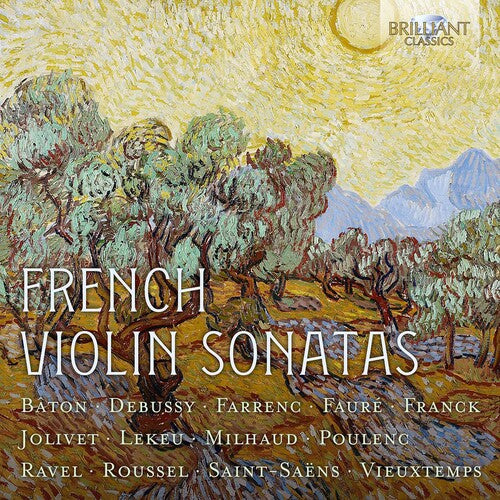
-
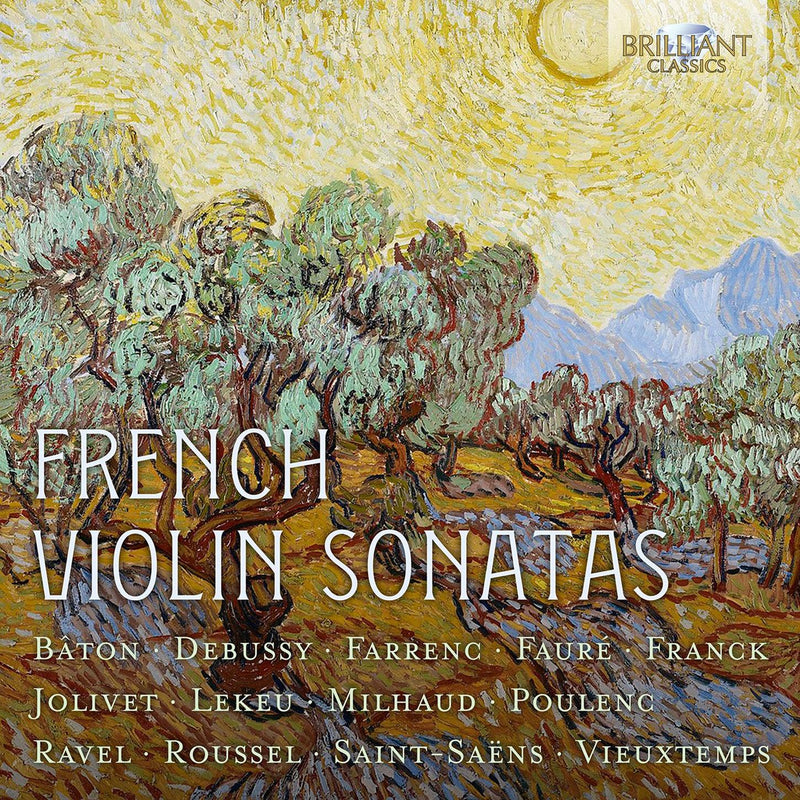
-
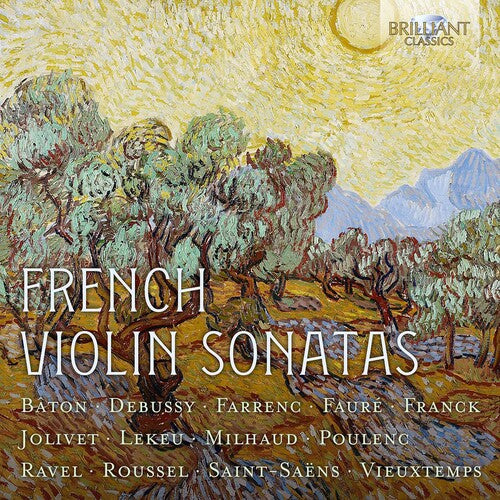 {# optional: put hover video/second image here positioned absolute; inset:0 #}
Brilliant Classics
{# optional: put hover video/second image here positioned absolute; inset:0 #}
Brilliant ClassicsFrench Violin Sonatas
The works in this collection emerged from the genre of duo concertant initially conceived as showcases for the virtuosity of Nicolò Paganini...
January 21, 2022$37.99$34.19 -

-

-
 {# optional: put hover video/second image here positioned absolute; inset:0 #}
On SaleSony Masterworks
{# optional: put hover video/second image here positioned absolute; inset:0 #}
On SaleSony MasterworksItzhak Perlman - Concertos, Sonatas & more...
R E V I E W S of some of the recordings that make up this set: It's always fascinating to go...
January 01, 2014$28.98$21.99 -
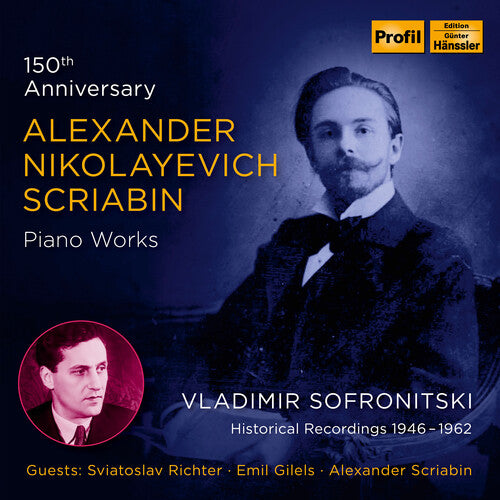
-
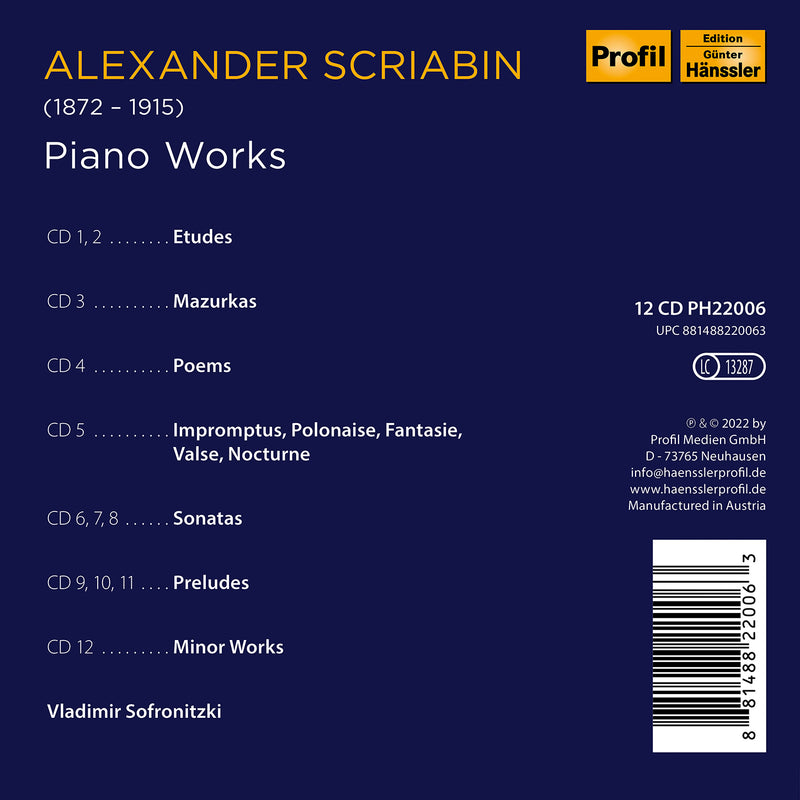
-
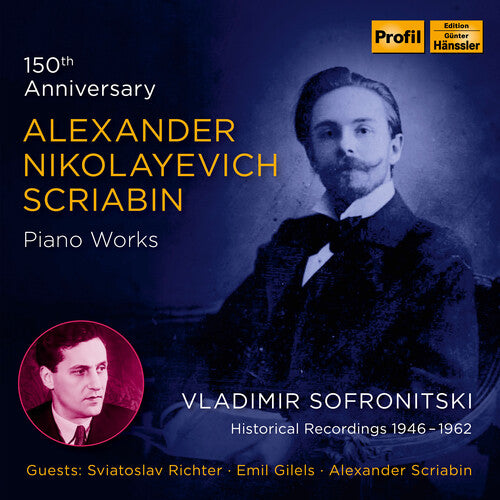 {# optional: put hover video/second image here positioned absolute; inset:0 #}
On SaleProfil
{# optional: put hover video/second image here positioned absolute; inset:0 #}
On SaleProfilScriabin: 150th Anniversary - Piano Works / Sofronitski
As pianist Andrei Hoteev puts it, Vladimir Sofronitzki's interpretations included an "improvisatory style", which corresponds with what musicologist Sigfried Schibli has noted...
April 01, 2022$37.99$28.99 -

-

-
 {# optional: put hover video/second image here positioned absolute; inset:0 #}
On SaleGrand Piano
{# optional: put hover video/second image here positioned absolute; inset:0 #}
On SaleGrand PianoThe Age of the Russian Avant-Garde - Futurists & Traditionalists
Modernity in Russian music emerged despite its struggles with the Soviet regime in the early 20th century, with the mystical vision of...
November 11, 2022$56.99$42.99 -

-

-
 {# optional: put hover video/second image here positioned absolute; inset:0 #}
On SaleSony Masterworks
{# optional: put hover video/second image here positioned absolute; inset:0 #}
On SaleSony MasterworksSchumann: Alle Lieder / Christian Gerhaher, Gerold Huber
Robert Schumann’s songs are not only one of the high points of musical Romanticism, they also represent a unique marriage of words...
October 08, 2021$79.98$59.99 -
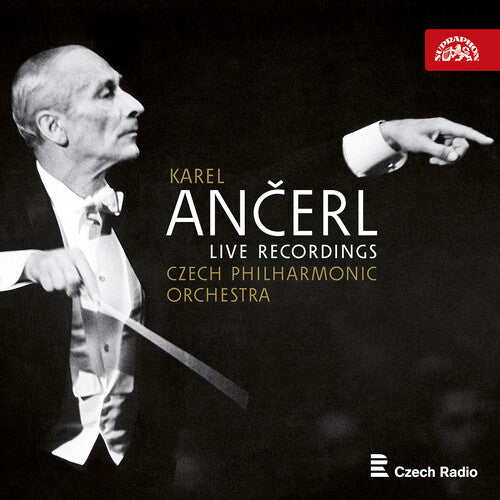
-
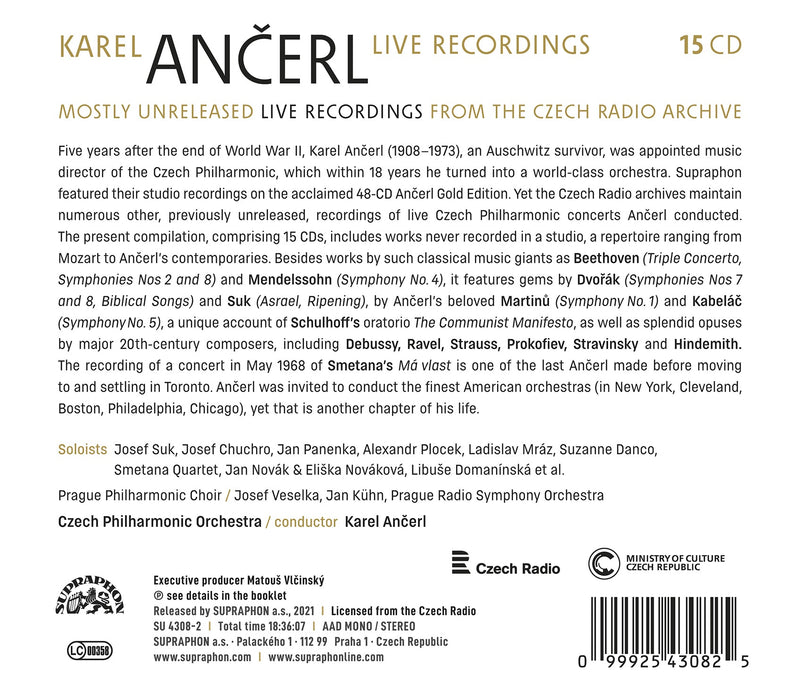
-
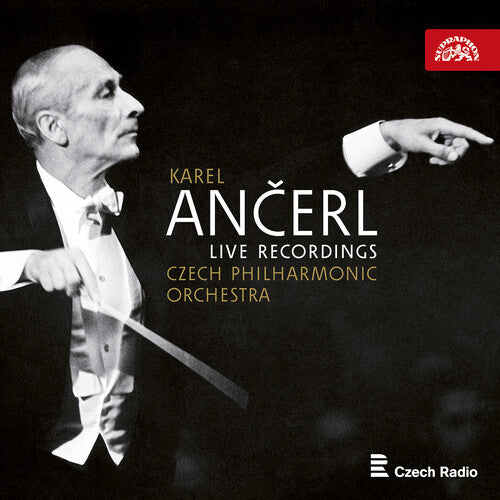 {# optional: put hover video/second image here positioned absolute; inset:0 #}
On SaleSupraphon
{# optional: put hover video/second image here positioned absolute; inset:0 #}
On SaleSupraphonKarel Ančerl: Live Recordings / Czech Philharmonic Orchestra
Previously unreleased recordings by one of the great conductors of the 20th century. Karel Ančerl. One of the most important conductors of...
February 11, 2022$149.99$112.99 -

-

-
 {# optional: put hover video/second image here positioned absolute; inset:0 #}
On SaleSony Masterworks
{# optional: put hover video/second image here positioned absolute; inset:0 #}
On SaleSony MasterworksJohn Barbirolli: Complete RCA & Columbia Album Collection
The young John Barbirolli was hardly known in America when the New York Philharmonic-Symphony Orchestra chose him to be Arturo Toscanini’s successor...
February 21, 2020$49.98$37.99 -
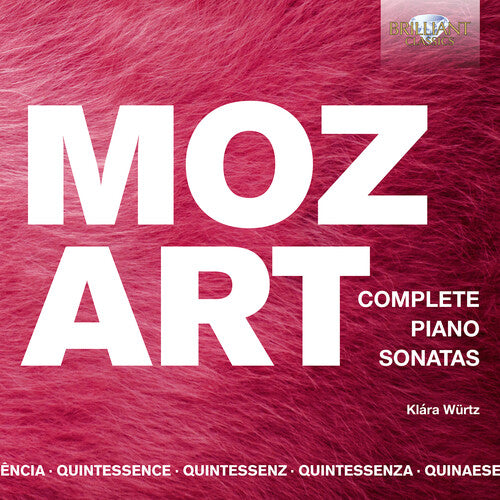
-
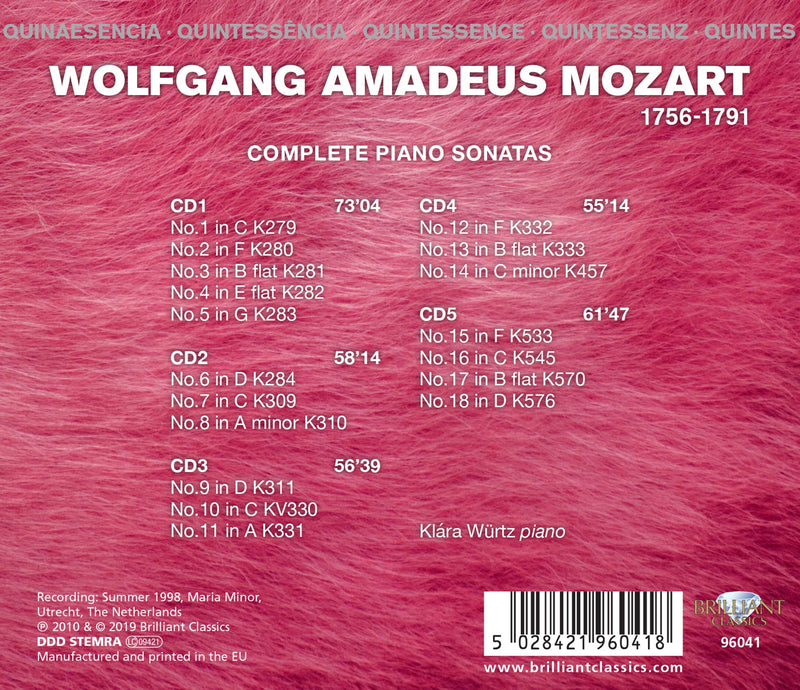
-
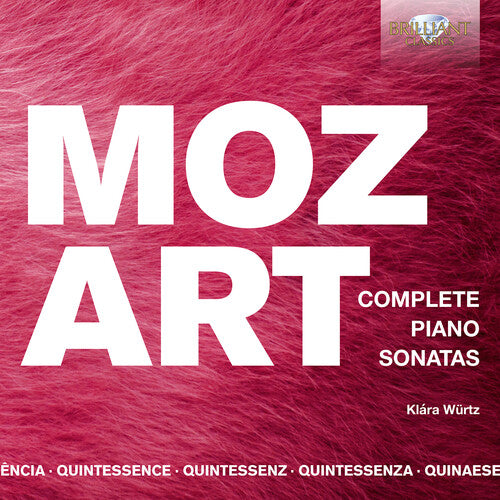 {# optional: put hover video/second image here positioned absolute; inset:0 #}
On SaleBrilliant Classics
{# optional: put hover video/second image here positioned absolute; inset:0 #}
On SaleBrilliant ClassicsMozart: Complete Piano Sonatas / Würtz
Brilliant Classics proudly presents the 5-album sets series: QUINTESSENCE, attractively priced compact box sets containing essential core classical repertoire in outstanding performances....
November 01, 2019$28.99$21.99 -
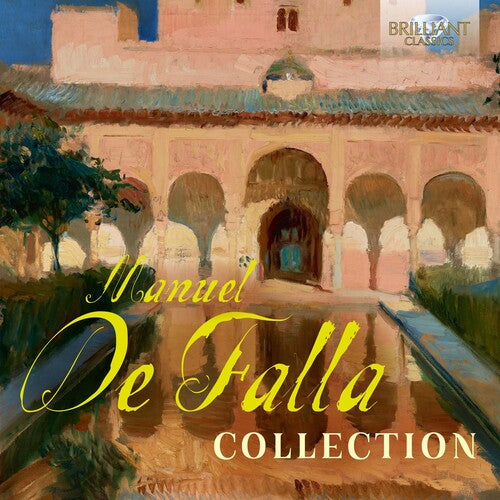
-
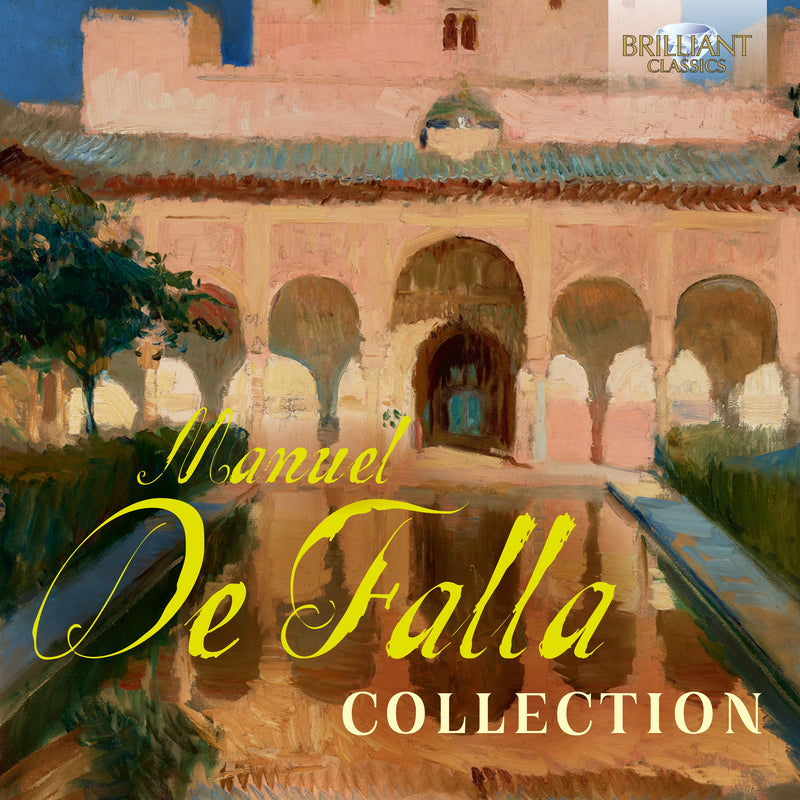
-
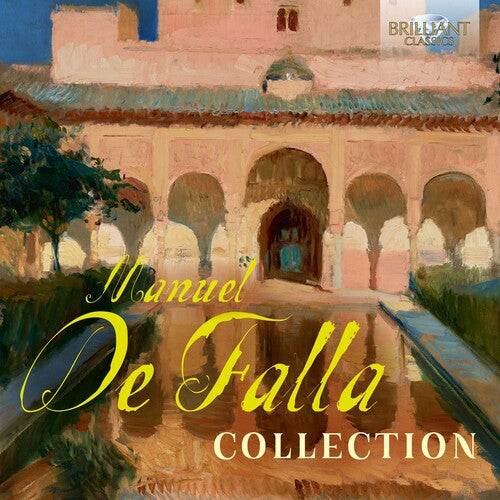 {# optional: put hover video/second image here positioned absolute; inset:0 #}
Brilliant Classics
{# optional: put hover video/second image here positioned absolute; inset:0 #}
Brilliant ClassicsManuel de Falla Collection
As the central figure of Spanish music in the first half of the last century, de Falla (1876-1946) came to define the...
$28.99September 24, 2021 -
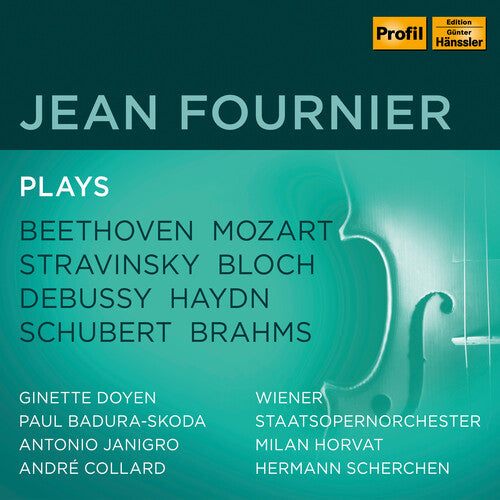
-
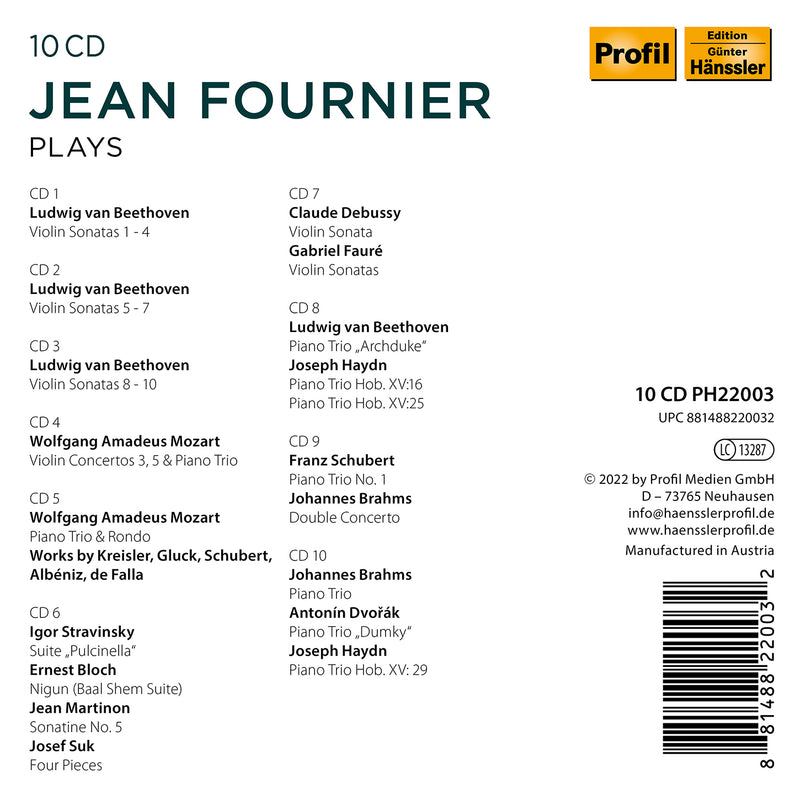
-
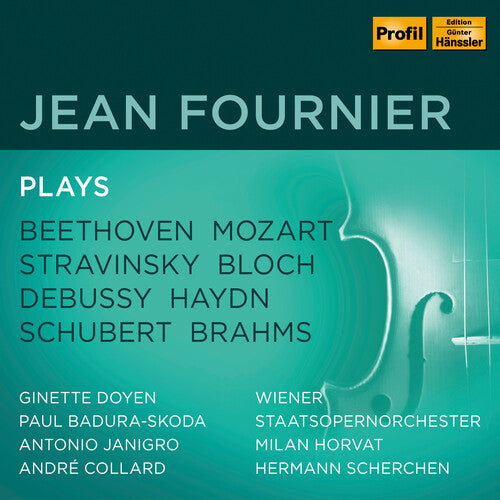 {# optional: put hover video/second image here positioned absolute; inset:0 #}
On SaleProfil
{# optional: put hover video/second image here positioned absolute; inset:0 #}
On SaleProfilJean Fournier Plays Chamber and Concerto Works
Jean Fournier (1911-2003) was a French violinist and professor of classical music. Fournier’s intonation, while lean, was gentle on the ear. He...
March 04, 2022$37.99$28.99 -

-

-
 {# optional: put hover video/second image here positioned absolute; inset:0 #}
On SaleOehms Classics
{# optional: put hover video/second image here positioned absolute; inset:0 #}
On SaleOehms ClassicsLehár: The Operetta Edition / Bibl, Maurer, Mörbisch Festival Choir and Orchestra
‘Arguably one of the strongest recordings in the whole Mörbisch operetta series, this is strongly recommended, and not just to die-hard operetta...
June 18, 2021$31.99$23.99 -

-

-
 {# optional: put hover video/second image here positioned absolute; inset:0 #}
Naxos
{# optional: put hover video/second image here positioned absolute; inset:0 #}
NaxosProkofiev: Complete Symphonies / Alsop, Orquestra Sinfônica do Estado de São Paulo
Sergey Prokofiev’s seven symphonies are acknowledged as one of the major cycles of the 20th century, and these recordings with Marin Alsop...
$51.99April 09, 2021 -
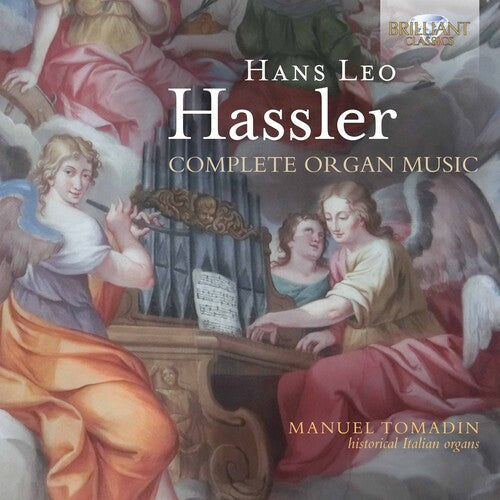
-
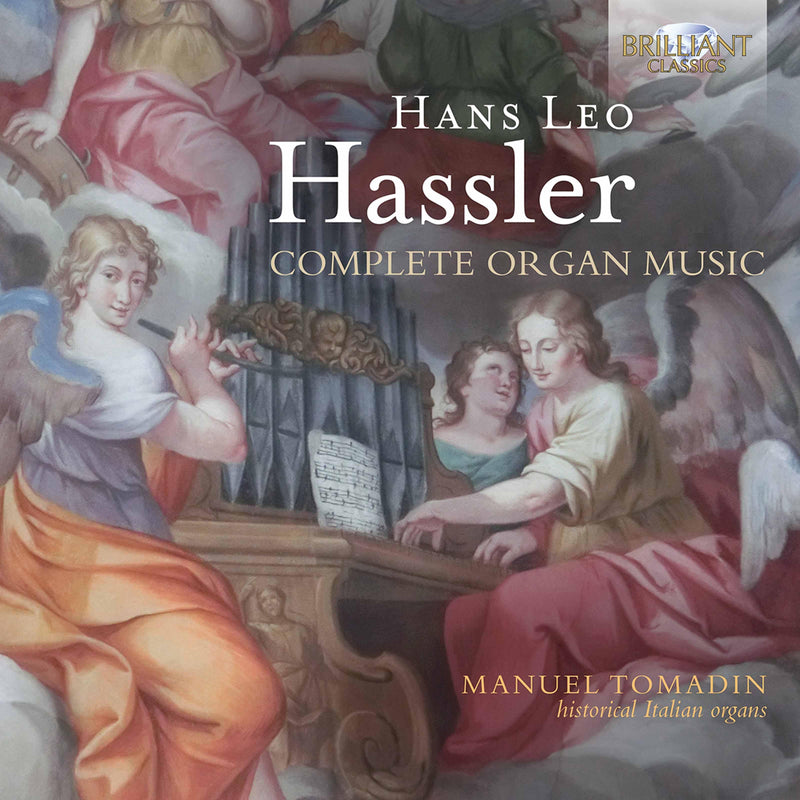
-
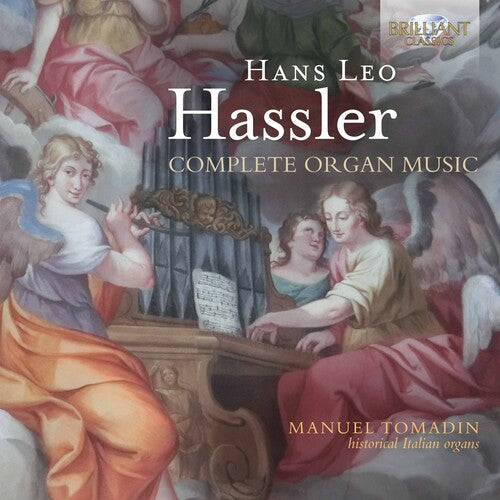 {# optional: put hover video/second image here positioned absolute; inset:0 #}
On SaleBrilliant Classics
{# optional: put hover video/second image here positioned absolute; inset:0 #}
On SaleBrilliant ClassicsHassler: Complete Organ Music / Tomadin
Born in Nuremberg in 1564 within a musical family, Hassler received his formative musical instruction from his father and quickly developed into...
February 25, 2022$54.99$27.48 -
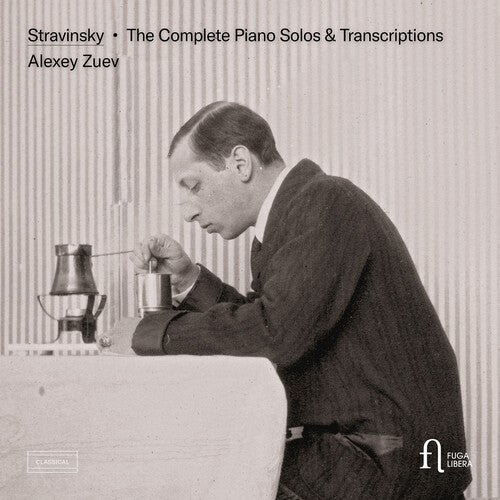
-
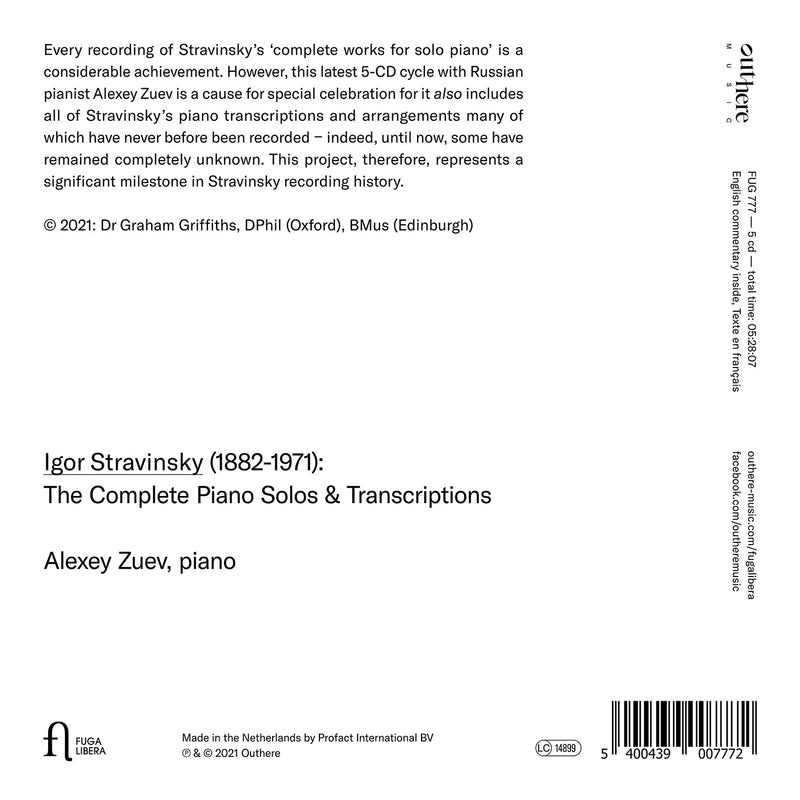
-
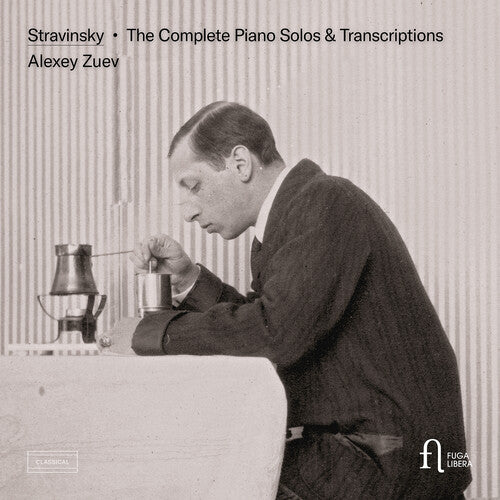 {# optional: put hover video/second image here positioned absolute; inset:0 #}
On SaleFuga Libera
{# optional: put hover video/second image here positioned absolute; inset:0 #}
On SaleFuga LiberaStravinsky: The Complete Piano Solos & Transcriptions / Zuev
Dr. Graham Griffiths writes: “Every recording of Stravinsky’s ‘complete works for solo piano’ is a considerable achievement. However, this latest 5-album cycle...
May 13, 2022$42.99$32.99 -

-

-
 {# optional: put hover video/second image here positioned absolute; inset:0 #}
Haenssler Classic
{# optional: put hover video/second image here positioned absolute; inset:0 #}
Haenssler ClassicHaydn: Great Choral Works / Rilling
Joseph Haydn is regarded as the "father of the symphony" and the "father of the string quartet" for his more than 100...
$32.99November 05, 2021
French Violin Sonatas
The works in this collection emerged from the genre of duo concertant initially conceived as showcases for the virtuosity of Nicolò Paganini and his successors in the Franco-Belgian school of violin playing, notably Henry Vieuxtemps. He and Louise Farrenc remain attractive outliers in the chronology of French violin sonatas, which began proper in 1877 with the first performance of Fauré’s First Sonata, followed in short order by comparably significant works by Saint-Saëns and Franck. These three works considered together form a trinity linked by features which came to define the character of the French violin sonata as a genre over the next few decades: recitative-like sections, cyclical form, modal techniques and organ-like pedal points, especially in the piano part – all three composers having spent a good part of their career as titular organists at landmark churches in Paris.
A further spur to the flood of of violin sonatas from Paris during the first decades of the 20th century was the abundance of superb performers who had made Paris their home: foremost among them Pablo Sarasate, Eugène Ysaÿe, Georges Enescu, and Jacques Thibaut. The Wagnerian shadow falling over works by Roussel and Lekeu is decisively dispelled by Debussy’s late and sinuous masterpiece, and then more radically by Ravel in the lazy, seductive Blues of his Sonata. The collection evolves further with a bold Sonata of 1932 by André Jolivet, whose movement titles advertise his rejection of the classical forms honored by previous rarities – not only Louise Farrenc but also Rhené-Emmanuel Bâton, who composed in a richly mystical but traditional idiom as an outlet for the creative urges accumulated and repressed like Mahler during his occupation as a conductor.
REVIEW:
A sure-fire bet for collectors of unusual repertoire is Brilliant Classics’ set of French Violin Sonatas, which is headed, interpretatively, by the Debussy, Ravel (Second), and Franck sonatas, superbly played by violinist Kristóf Baráti and pianist Klára Würtz. All of these excellent recordings date from between 1987 and 2020.
-- Gramophone
Itzhak Perlman - Concertos, Sonatas & more...
R E V I E W S of some of the recordings that make up this set:
It's always fascinating to go back to the early recordings of artists who are firmly ensconced in the classical music pantheon. Such is the case with this recording of the Tchaikovsky and Sibelius concertos made by Itzhak Perlman in the late 1960s.
The Tchaikovsky concerto was written for virtuoso violinist Leopold Auer who actually thought the work unplayable. The young Perlman brings passion and flash to the concerto; his playing is suitably poetic in its sentimental moments and fiery in its finale. Sibelius's concerto was written about the same time that he wrote his second symphony. Perlman grasps the concerto's romantic soul while standing up to its demanding modernist technical challenges. As an added bonus the recording includes Dvorák's Romance, a gentle idyll that displays Perlman's lovely legato playing. -- MUZE [review of RCA 63591]
This album continues the tribute to classic film music from John Williams and Itzhak Perlman's CINEMA SERENADE disc. It is an undeniably old-fashioned and romantic album, befitting the era the music is drawn from. On "As Time Goes By" from CASABLANCA, Perlman proves that he's still one of the world's premier concert violinists, playing the theme with palpable ache. Most of these compositions are by the classic film composers--Alfred Newman, Miklós Rózsa, Max Steiner--with one notable exception. William Walton's theme for HENRY V gets a suitably regal, yet restrained, treatment. Perlman sounds as if he's having a good time with the sprightly Irish motifs of "The Quiet Man." The orchestrations are rich and dramatic, and the recording quality is superb. This album is highly recommended to anyone who remembers when a soundtrack was more than just a bunch of flavor-of-the-month pop tunes. -- MUZE [review of SONY 60773]
Prokofiev's F minor Sonata—surely his greatest chamber work—opens bleakly, then flowers to harmonic richness before switching to a sharp-edged Allegro brusco, a deeply introspective Andante and a closing Allegrissimo that recalls (or anticipates, depending on its precise chronology in Prokofiev's thinking) the finale of the great Eighth Piano Sonata... Perlman's is an immensely assured, sweet-centred reading, delicate where needs be (the ''wind in a graveyard'' passages of the first movement, for example) and yet with a Heifetzian resilience that both sonatas willingly respond to... When it comes to the delightful Second Sonata—of rather less import, and a second-hand utterance (the original was for flute and piano)—Perlman and Ashkenazy play with astonishing virtuosity and here their visceral virtues win hands down, especially in the Scherzo... the playing has real class, the recording is clean and there's a substantial bonus in Perlman's accomplished 1966 version of the Second Violin Concerto, where Leinsdorf and the Boston Symphony trace and characterize the score's every subtle detail—especially among the woodwind. That, for me, is the disc's most indelible interpretative feature. -- Gramophone [review of RCA 61454]
Scriabin: 150th Anniversary - Piano Works / Sofronitski
As pianist Andrei Hoteev puts it, Vladimir Sofronitzki's interpretations included an "improvisatory style", which corresponds with what musicologist Sigfried Schibli has noted as a characteristic of Scriabin's own playing, going on to say Scriabin "developed his own style of playing the piano" with "alertly varied rhythms and dynamics...combined with a delicate touch and spontaneous agogics." Indeed, Sofronitzki's Scriabin performances have often been praised for their idiomatic, "poetic" rubato together with a flair for musical architecture and rhythmic precision. In his desire for fidelity to the original, Sofronitzki's highly sensitive use of the pedal reflects his striving to abide by the composer's expressive markings as closely as possible. His affinity with Scriabin's oeuvre may derive from the fact that both the composer and the pianist himself were influenced by the music of Frédéric Chopin. Having spent his childhood in Warsaw, where his family had settled when he was two years old, Sofronitzki came to be regarded as setting new standards for Chopin interpretation - an artistic focus that goes back to his first piano tuition in the Polish capital. In 1949, the centenary of Chopin's death, Sofronitzki performed all his piano works on five successive days at the great hall of the Tchaikovsky Conservatory in Moscow.
REVIEWS:
The flow of melody and the highest transparency of musical events were top priorities for Vladimir Sofronitzky, whom Emil Gilels called the greatest piano player in the world and of whom the famous Heinrich Neuhaus said, « He plays like a god and looks like a god. » Let’s look closely at these two statements: Gilels speaks of the piano player not of the pianist. Consciously or unconsciously? And Neuhaus speaks of the god. God, is that power? Mightiness? Because Sofronitzky’s playing is powerful. It is dramatic and sonorous. This is Sofronitzky’s individualism: his feelings are those of sovereignty, of control. Poetry and tenderness are not his thing. And so the recordings of this edition impress me more than they touch me.
However, those who are intoxicated by consummate piano technique will be happy with this. In addition to the Etudes, Mazurkas, Preludes, Impromptus, Nocturnes and Poèmes, this box includes the legendary near-complete recording of the piano sonatas with Vladimir Sofronitzky. Only the first three movements of the 1st Sonata and the 9th Sonata, which the pianist never recorded out of respect for Scriabin, are missing and replaced by recordings by other pianists. Sofronitzky’s interpretations are phenomenal: he literally chisels the music into sculptures, relentless, accented, yet often very restrained and labored for nuance. Nevertheless, it is the enormously powerful playing that dominates and captivates the listener[.]
-- Pizzicato
These are historical recordings from 1946 to 1962, played primarily by Sofronitski; all the others are listed as guests. Profil celebrates Scriabin’s 150th birthday with a nearly complete collection of his solo piano works. This remastered collection has cleaned things up to today’s standards.
"Historical Recordings 1946-1962" is correct for all the recordings here except Scriabin’s tracks. There is not a bad performance in this collection. A few choices were made that I didn’t agree with, but, by and large, this is spectacular Scriabin...I was amazed at the musical concentration Sofronitsky summoned to play such beautifully shaped phrases on such an instrument. Anyone who enjoys Scriabin’s piano music will find exceptional performances on each disc here.
-- American Record Guide
The Age of the Russian Avant-Garde - Futurists & Traditionalists
Modernity in Russian music emerged despite its struggles with the Soviet regime in the early 20th century, with the mystical vision of Scriabin’s musical legacy providing a foundation on which to build. In these acclaimed albums we discover Medtner’s life affirming Sonatas, and hear Lourié’s journey from Impressionism to pioneering Cubist conceptions. Mosolov’s works are bold and complex, while Roslavets new tonal system brings ‘fi re and ice’, and Stanchinsky’s sophisticated virtuosity anticipates many aspects of 20th-century style. These remarkable works represent a time of profound change in Russian culture that is still being discovered and assessed today.
Past praise for previously released volumes included in this set:
Mosolov: Complete Works for Solo Piano / Andryushchenko
These are outstanding performances of works that deserve to be heard. The sonatas, in particular, are impressive and, though Scriabin’s spirit runs through much of these compositions they are fine works in their own right.
-- The Classical Reviewer
Louriè: Complete Piano Works, Vol. 1 / Koukl
Arthur Lourie turns out to be a pretty darn good composer—too good to have been left in the attic trunk all these years. The Five Fragile Preludes, Op. 1, have a natural flow to them, and an inevitability that is both rhythmically and harmonically arresting in an impressionism somewhat redolent of Debussy mixed with early Scriabin. While exceedingly brief, they are lovely, perfect jewels. All of this is well described in Anthony Short’s notes, a recording of demonstration quality, and a pianist totally in tune with the music.
-- American Record Guide
Medtner: Complete Piano Sonatas, Vol. 2 / Stewart
Paul Stewart’s love and admiration for Medtner’s music come through strongly in these performances, which require a great range of treatment from the gentlest of touches, sometimes merely brushing the keys, whilst at others displaying a towering emotional intensity. His ability to bring out the poetry in Medtner is impressive and the recording is crisp, which combination makes for a hugely satisfying experience.
-- MusicWeb International
Roslavets: Complete Piano Works / Andryushchenko
For those listeners yet to encounter this fascinating figure, please fear not—Roslavets’ work is appealing on a number of levels and you will find much to enjoy on this terrific pair of discs.
-- MusicWeb International
Louriè: Complete Piano Works, Vol. 2 / Koukl
I am glad to have had the opportunity to hear so much of Lourié’s music which is so interesting and so tuneful and so varied it seems he was a chameleon in more than just his assumed persona but in his music as well and it’s all the better for it; variety is the spice of music as well as of life itself. Giorgio Koukl is nothing if not a consistently impressive advocate of whichever composer’s music he takes it upon himself to focus on and I thoroughly recommend this disc to all lovers of solo piano music.
-- MusicWeb International
Stanchinsky: Complete Piano Works, Vol. 1 / Solovieva
The short-lived Alexey Stanchinsky (1888-1914) has shown up on my Want Lists before, but despite devoted advocacy by a few pianists, his Scriabin-inspired music hasn’t caught on. It’s not clear why: His works are wildly inventive in their treatment of rhythm, harmony, and counterpoint—and while he died before he got to solidify his style, the dizzying sense of adventure in even his earliest works is palpable. May this new release by Olga Solovieva (the first volume of a complete cycle) be the one that turns the tide.
-- Fanfare
Schumann: Alle Lieder / Christian Gerhaher, Gerold Huber
Robert Schumann’s songs are not only one of the high points of musical Romanticism, they also represent a unique marriage of words and music. Not since Dietrich Fischer-Dieskau’s pioneering recording in the 1970s has there been a singer who has explored Schumann’s entire lieder output in such detail. As one of the foremost lieder singers of our day, Christian Gerhaher has gone even further than Fischer-Dieskau and together with his brilliant pianist Gerold Huber has realized one of his dearest wishes after more than three decades of intensive engagement with Schumann’s music.
Their 11-CD edition of Robert Schumann: The Complete Songs will be released on September 3, 2021 and will be available digitally as well. A co-production between Sony Classical and BR-KLASSIK, with the support of the International Song Centre Heidelberg, initiated by the Heidelberger Frühling music festival, this set features 299 songs – almost the whole of the composer’s lieder output. The approach adopted by Christian Gerhaher and Gerold Huber is artistic and biographical rather than encyclopaedic. Schumann famously focused on lieder composition during two periods in his life: 1840–41 and 1849–53. By analogy with this focus, the first six CDs are devoted to the earlier period, the remaining five to the later years. Within this arrangement, Gerhaher and Huber have consciously eschewed a purely chronological or purely thematic approach, their aim being to preserve what for Schumann himself was the essential unity of his song cycles and to embed the individual songs within a chronological and thematic inner context. The songs that Schumann wrote during his youth and that were not published during his lifetime have not been included in this project. Also omitted are the melodramas and the works that deviate from classical song form or that are a part of much longer works. In the wake of these recordings, Gerhaher has also subjected his earlier Schumann releases to a critical overhaul. The bulk of the songs that appeared in his earlier albums Dichterliebe and Melancholie in 2004 and 2007 respectively have been re-recorded (among these songs are Dichterliebe op. 48 and the Sechs Gedichte und Requiem op. 90); conversely, other earlier recordings, including the Eichendorff Liederkreis op. 39, have been taken over into the present set. This unique project acquires an extra appeal as a result of new recordings of the cycles for female voice, the rarely heard duets and trios and works for several voices such as the Spanisches Liederspiel op. 74, in which Schumann raised the medium to a whole new artistic level. Among the other eminent artists featured in this edition are Sibylla Rubens, Camilla Tilling, Julia Kleiter, Wiebke Lehmkuhl, Martin Mitterrutzner, Christina Landshamer and Anett Frisch.
The extensive booklet includes all the song texts together with an introduction by the German musicologist Laurenz Lütteken, while Gerhaher himself has set down his personal thoughts on the individual songs. A detailed index completes the documentation. These recordings were supported by the Robert Schumann Research Centre in Düsseldorf.
REVIEWS:
A wonderful achievement and a marvel of sustained artistry: subtle, intelligent performances, impeccably prepared and movingly executed.
– Gramophone (Editor's Choice, October 2021)
It’s undoubtedly a fine, constantly rewarding set, with every song delivered with the fastidious attention to detail and to the individual coloring of each phrase that has always been a feature of Gerhaher’s lieder singing.
– Guardian (UK)
Karel Ančerl: Live Recordings / Czech Philharmonic Orchestra
Previously unreleased recordings by one of the great conductors of the 20th century.
Karel Ančerl. One of the most important conductors of post-war Europe. A man who survived the Nazi concentration camps and the avowed anti-Semitism of communist Czechoslovakia. An artist who, through enormous patience and dedication, built the Czech Philharmonic into a world-class orchestra and introduced it successfully at the most important concert halls.
From 2002 to 2008, Supraphon issued the highly acclaimed Ančerl Gold Edition with the bulk of his artistic legacy, containing nearly his complete studio recordings with the Czech Philharmonic on 48 albums. But that was far from everything. Hidden in the archive of Czech Radio, there is a wealth of concert recordings that gives us a more complete picture of this conductor. From that treasury, on 15 albums, Supraphon has selected repertoire of which studio recordings were not made; that repertoire covers a broad range from Mozart to works by Ančerl’s contemporaries.
The recordings include masterpieces by Dvořák (Symphonies Nos. 7 and 8, Biblical Songs) and Suk (Asrael, Ripening), music by composers admired and promoted by Ančerl (Martinu Symphony No. 1 and Kabelác Symphony No. 5), and major works of the worldwide 20th-century repertoire (Debussy, Ravel, Strauss, Prokofiev, etc.). The only exception of a “duplication” of a studio recording is Smetana’s Má vlast. This taping of a Prague Spring Festival concert in May 1968 was one of the last recordings Ančerl made before his definitive departure for Toronto. The concert recordings from the years 1949-1968 document the maturing of this remarkable artist perhaps even more clearly than his studio legacy.
REVIEW:
Performances appearing on CD for the first time include, most notably, Josef Suk’s epic Asrael symphony (1967), a recording that captures the full emotional range of what’s surely the greatest Czech symphony after Dvo∑ák. Most impressive is the impact of Suk’s vivid orchestration, the timpani and bass drum especially, and the way An∂erl charts the work’s dramatic sequence of events, its emotional extremes and tragic demeanor. Never before have I felt the ‘angel of death’ transform into the ‘angel of love’ at the end of the work as it does here. Even the memorable Václav Talich (also on Supraphon) doesn’t quite match up. The mono sound is exceptionally clear but Suk’s The Ripening, another fine performance, is offered in stereo, as is Smetana’s Má vlast (both 1968), where the vengeful third piece, about the fearsome amazon Šárka, is driven to paroxysms of rage.
Perhaps the most absorbing inclusion conceptually is Ervín Schulhoff’s musical setting of portions from the Communist Manifesto. Beyond his miraculous survival of Auschwitz (where his family was murdered), An∂erl joined the Communist Party of Czechoslovakia. Schulhoff had sent the only copy of his full score to the Leningrad Conservatory for safe keeping, but it was believed lost during the long siege of the city and the version that An∂erl conducts here (in 1962) is an orchestration by Svatopluk Havelka. Schulhoff had become convinced by the ideas coming out of the Soviet Union after working in Berlin in the 1920s and ’30s and was on the run from the Nazis in the later years of the 1930s, but was captured in 1941 and died in Wülzburg concentration camp in 1942 of tuberculosis. Whatever one’s political leanings (even in view of the subsequent Soviet invasion of An∂erl’s homeland, not to mention Ukraine at the present time), one can understand why he connected so deeply with fascism’s nemesis. The work itself resembles, on the one hand, the politically charged choral pieces of Prokofiev and Shostakovich, while on the other recalls the world of Mahler (try disc 15 track 6 from 7'25", where you can hear clear echoes of Mahler’s Sixth Symphony).
This is an extremely important set, very well transferred, superbly annotated (by Petr Kadlec) and sturdily presented. I can’t recommend it more highly than that.
-- Gramophone (Rob Cowan)
John Barbirolli: Complete RCA & Columbia Album Collection
The young John Barbirolli was hardly known in America when the New York Philharmonic-Symphony Orchestra chose him to be Arturo Toscanini’s successor starting in 1937. The 36-year-old Londoner’s first season was a triumph with both players and audiences, and although his years in New York would be increasingly marred by unfair rivalry with Toscanini – lured back to lead a specially created NBC Symphony – and by partisan hostility from two influential critics, Barbirolli’s tenure can now be looked back on as a real success.
From 1938 until 1943, when he returned to the UK to take over Manchester’s Hallé Orchestra, Sir John made a series of recordings in New York for American Columbia and RCA Victor which are still essential for a full appreciation of this revered conductor’s career, “performances that are as competitive today as they were when initially released” (Fanfare). Sony Classical is pleased to reissue them in a newly remastered six-CD set.
Among the treasures here are Debussy’s Iberia and Tchaikovsky’s Francesca da Rimini (both recorded in 1938) and the first-ever recording of Schubert’s Fourth (“Tragic”) Symphony (from 1939), together cited by Gramophone as “a demonstration that the Philharmonic-Symphony had few rivals in the world at the time as a recording orchestra … A forceful, high-powered reading [of the symphony] which yet has a Schubertian smile … The crisp attack in the Tchaikovsky, even tauter than in Barbirolli’s superb 1969 HMV New Philharmonia version, is thrillingly caught. The Debussy brings the most vivid sound of all, weighty and full of presence, with castanets and brass leaping out from the speakers. This is a white-hot performance, every bit as exciting as those of Toscanini, and with a moving vein of tenderness in the slow second movement.”
There are several works by Mozart, among them the Clarinet Concerto with Benny Goodman (from 1940) and the Symphony No. 25 and Piano Concerto No. 27 with Robert Casadesus (both from 1941). The Piano Concerto’s opening Allegro “is beautifully shaped with an almost palpable sense of wonder in the music and the pianist is definitely having a ball of time,” said Classical Net. “The final Allegro is also very commendable for its grand sense of pomp and majesty … The exquisite symphony also receives wonderful attention and care from Barbirolli and the NYPSO. Here one can sense the conductor's love for Mozart’s inspired melodies … Benny Goodman is a characterful interpreter of the Clarinet Concerto.”
“The generous flavor of Barbirolli’s Brahms comes through in the Academic Festival Overture and the Second Symphony [both from 1940],” wrote Audiophile Audition’s reviewer. “The Overture is rife with ceremonial grandeur and jolly spirits. The D major Symphony has a debonair airiness and bucolic relaxation about it.” And Sibelius’s First Symphony (from 1942) “should delight fans of Barbirolli’s 1960s complete traversal of the symphonies … The conductor’s warmth, vision, and emotional urgency has lost none of its appeal in the more than half century that has passed” (Fanfare).
Also from 1942 is Nathan Milstein playing the Bruch Concerto with “the Philharmonic-Symphony in tremendous form,” exclaimed MusicWeb International’s critic. “Barbirolli opens powerfully and Milstein responds in kind; not over emoted and with vibrato perfectly scaled to the demands of the music. He is really quite withdrawn and introspective in the Adagio, powerfully so indeed, and Barbirolli brings out the horn harmonies in a way that seems to reveal them for the first time. There is romantic fervour but also passagework clarity and digital cleanliness in the finale … a model of concerto accompaniment and creative collaboration.”
CONTENTS
DISC 1:
Purcell (arr. Barbirolli): Suite for Strings, Woodwind and Horns (Remastered)
Debussy: Images pour orchestre, L. 122: No. 2, Iberia (Remastered)
Tchaikovsky: Francesca da Rimini, Op. 32 (Remastered)
Respighi: Antiche danze et arie per liuto, Suite No.3 (Remastered)
Respighi: Fontane di Roma (Remastered)
DISC 2:
Schubert: Symphony No. 4 in C Minor, D. 417, "Tragic" (Remastered)
Schubert: 5 German Dances, D. 89 (Remastered)
Brahms: Symphony No. 2 in D Major, Op. 73 (Remastered)
DISC 3:
Sibelius: Symphony No. 1 in E Minor, Op. 39 (Remastered)
Sibelius: Symphony No. 2 in D Major, Op. 43 (Remastered)
DISC 4:
Smetana: The Bartered Bride, JB 1:100: Overture (Remastered)
Rimsky-Korsakov: Capriccio espagnol, Op. 34 (Remastered) with Mishel Piastro, violin & Joseph Schuster, cello
Ravel: La valse, M. 72 (Remastered)
Berlioz: Roman Carnival Overture, Op. 9 (Remastered)
Brahms: Academic Festival Overture, Op. 80 (Remastered)
Debussy: Petite Suite, L. 65, No. 4 "Ballet" (Remastered)
Debussy: Première rhapsodie, L. 116 (Remastered) with Benny Goodman, clarinet
Bach, J.S. (arr. Barbirolli): Sheep May Safely Graze, BWV 208, No. 9 (Remastered)
DISC 5:
Mozart: Clarinet Concerto in A Major, K. 622 with Benny Goodman, clarinet
Mozart: Piano Concerto No. 27 in B-Flat Major, K. 595 (Remastered) with Robert Casadesus, piano
Mozart: Symphony No. 25 in G Minor, K. 183 (Remastered)
DISC 6:
Bruch: Violin Concerto No. 1 in G Minor, Op. 26 (Remastered) with Nathan Milstein, violin
Tchaikovsky: Suite No. 3 in G Major, Op. 55: IV. Tema con variazioni. Andante con moto (Remastered)
Various (arr. Barbirolli): An Elizabethan Suite (Remastered)
-----
REVIEW:
It is surely no coincidence that this retrospective set is released in the 50th anniversary year of Sir John Barbirolli’s death. It focuses on almost all – but not quite all – of Barbirolli’s recordings with his Philharmonic-Symphony Orchestra of New York, here updated to ‘New York Philharmonic’. The missing item is the Schumann Violin Concerto with Menuhin, the rights of which now lie with Warner. The inclusion of Bach's Sheep May Safely Graze is very welcome here, and as Leonard Slatkin showed in his Bach ‘Conductors’ Transcriptions’ album, it’s a most effective and affecting piece of work.
The first of the six well-filled discs disinters Barbirolli’s arrangements of Purcell. The six-movement Suite proves memorably sonorous and full bloodied with highlights being Fairest Isle and When I am Laid in Earth. This is followed by a splendidly recorded and vividly played Iberia with the Victor engineers on top form, and Francesca da Rimini. Respighi’s The Fountains of Rome and the Arie di corte from the Ancient Airs and Dances are similarly charged.
The Schubert Fourth on Disc 2 - the first recording of the work ever made - is tremendously impressive: powerful, lyrical, excellently controlled. Brahms’ Second Symphony however is exceptionally fast – not a criticism that could ever be levelled at the older JB – and if one thinks that Monteux in San Francisco in 1945 was fleetness itself that would be to reckon without Barbirolli. The Allegretto is uncomfortable to listen to and in fact the whole performance is unconvincing on a number of levels.
Sibelius comes to the rescue in disc three where there are memorable recordings of the First Symphony (1942) and the Second (1940). Sibelius was a known Barbirolli strength but his tempi in the 1950s with the Hallé are predictably more driven than those he took in the following decade. If sound quality is king then the Hallé recordings from the 60s are preferable but interpretively the 1957 First and the 1952 Second – along with the famous RPO Second – are indispensable, along with these two New York recordings.
The fourth CD is a bits-and-pieces affair. There’s lusty Smetana, a brightly recorded but idiomatically played Rimsky Capriccio espagnole, and La Valse which faced predictably strong competition on disc from Munch and Monteux. If the string tone in Le Carnaval romain is a touch acidic, the Academic Festival Overture is more rounded, and the performance a strong B plus. Benny Goodman joins for a timbrally distinctive Debussy First Rhapsody. There’s more Goodman in the penultimate disc where he plays Mozart’s Clarinet Concerto. Casadesus and Barbirolli make a fine team in Mozart’s Concerto No. 27. Symphony No.25 completes this all-Mozart disc; athletic, youthful and vibrant.
Nathan Milstein’s excellent Bruch G minor heads the final disc and whilst the recording is not top-drawer, Milstein’s playing is. Tchaikovsky’s Tema con variazioni from the Orchestral Suite No.3 is slightly cut. Finally, we end with Barbirolli’s An Elizabethan Suite, his arrangements of Byrd, Farnaby, and Bull, a synchronous way to end given that the first piece of the first disc was his Purcell arrangement.
Each disc is housed in a retro, 78rpm album sleeve and the booklet is filled with 78 and subsequent LP sleeves – very colourful and tactile – as well as job and recording sheets from the sessions and black and white photographs of Barbirolli.
This box is a finely produced and concentrated focus on Barbirolli’s New York shellac years and comes with a fair-minded, level-headed booklet note from James H North.
– MusicWeb International (Jonathan Woolf)
Mozart: Complete Piano Sonatas / Würtz
Brilliant Classics proudly presents the 5-album sets series: QUINTESSENCE, attractively priced compact box sets containing essential core classical repertoire in outstanding performances. Aimed at attracting both the discerning classical connoisseur and the classical newcomer it presents the pillars of classical music freshly packaged with eye-catching colorful and booklets containing liner notes in English. A new series at an unbeatable price!
The present installment features Mozart’s complete piano sonatas, performed by pianist Klara Würtz.
Excerpt from a review of a previously released edition of this set:
The Hungarian pianist Klára Würtz's Mozart performances here are, in a word, miraculous. Listening to this set left me almost speechless. By the time I finished auditioning just the first six sonatas, I knew that Würtz’s Mozart was something special. Highest recommendation.
-- Jeffrey J. Lipscomb, FANFARE
Manuel de Falla Collection
As the central figure of Spanish music in the first half of the last century, de Falla (1876-1946) came to define the sound of Spain for listeners beyond its borders. Folk music, romanticism, neoclassicism, modernism: all the prevalent styles of his time were assimilated and absorbed within a personal idiom that advanced the work of notable predecessors such as Albeniz and Granados in establishing a distinctively Spanish idiom for art music, making him a worthy contemporary of other composers outside the central European mainstream from Vaughan Williams in England to Bartók in Hungary and Sibelius in Finland. Falla’s cycle of Seven Popular Spanish Songs is a perfect synthesis of artsong and folksong, performed here in Luciano Berio’s orchestration by Marta Senn and the Simon Bolivar Orchestra of Venezuela under the baton of Eduardo Mata, the Mexican conductor renowned for his dynamic interpretations of Hispanic repertoire. The songs return in their instrumental guise as the Suite populaire espagnole, with the cellist Timora Rosler accompanied by Klára Würtz. Rafael Puyana is a uniquely sympathetic soloist in the Harpsichord Concerto which gave the instrument new life beyond its Baroque associations. Benita Meshulam is widely recognized as the inheritor of Alicia de Larrocha’s mantle with her superbly atmospheric recordings of Spanish piano music.
REVIEW:
Manuel de Falla Collection is an honest title, since the five CDs present only a selection of his works, including well-known ones such as Nights in Spanish Gardens, El Amor Brujo, and The Three-Cornered Hat. The recordings with the Simon Bolivar Symphony Orchestra from 1981 convey particularly well the intensity of Spanish emotional worlds that Central Europeans like to assume. The round is opened with El Amor Brujo in a striking and lively performance. The interpretation of the Seven popular Spanish Songs, as well as Homenajas let the listener dive into Spanish worlds. The three dances from The Three-Cornered Hat in the version for orchestra will be joined by others in the piano version on a later CD.
For the recordings made in Venezuela, the conductor Eduardo Mata certainly holds the orchestra together and inspires it to effective performances. One could well imagine more sensitivity here, the nocturnal sultriness of the tango instead of the midday heat, so to speak, but there is little more to offer in the way of fire and color. More delicacy without sacrificing the technical quality of the recording is offered by the oldest recording.
In Nights in Spanish Gardens, the Berlin Symphony Orchestra performs under the judicious direction of Günther Herbig. The singers go along with the emotional South American approach, not without delicately savoring the music.
The two pianists offer mature quality. Benita Mehuslam, who has also recorded the complete works for piano by De Falla on the label, is featured here with excerpts, Dances from the The-Cornered Hat and Spanish pieces. In the only chamber work, besides the piano music, Klara Würtz accompanies cellist Timora Rosler on the piano in the Suite Populaire Espagnole. The two artists, who have also won awards as a duo, give the top dance of sensitivity and European noblesse, so to speak, with their interpretation that concludes the collection. Harpsichordist Rafael Puyana from Colombia can show all the registers of his skills in the harpsichord concerto. Here and also in El Retablode Maese Pedro as well as in Psyche the Solistas de Mexico play, again conducted by Eduardo Mata. Those who want to experience this composer intensively will find in this compilation a good opportunity to be infected by the joie de vivre of the music.
-- Pizzicato
Jean Fournier Plays Chamber and Concerto Works
Lehár: The Operetta Edition / Bibl, Maurer, Mörbisch Festival Choir and Orchestra
‘Arguably one of the strongest recordings in the whole Mörbisch operetta series, this is strongly recommended, and not just to die-hard operetta fans.’ (Fanfare on Der Graf von Luxemburg). This Operetta Edition presents popular works by Franz Lehár that were recorded at the Mörbisch Festival and feature the Mörbisch Festival Choir and Orchestra under the direction of Rudolf Bibl and Wolfdieter Maurer (Der Zarewitsch). The edition comprises Das Land des Lächelns, Giuditta, Die lustige Witwe, Der Graf von Luxemburg and Der Zarewitsch.
REVIEW:
At the helm of the Mörbisch Festival Orchestra is Austrian conductor and pianist Rudolf Bibl (1929-2017), except for Der Zarewitsch under Wolfdieter Maurer. The cast of artists in each of these delightful operettas is far too extensive to identify individually but be assured, each production is echt Lehár and, of course, unmistakably Viennese. The librettos are sung in German.
-- The Whole Note (CA)
Prokofiev: Complete Symphonies / Alsop, Orquestra Sinfônica do Estado de São Paulo
Sergey Prokofiev’s seven symphonies are acknowledged as one of the major cycles of the 20th century, and these recordings with Marin Alsop and the Sao Paulo Symphony Orchestra have received widespread critical acclaim. From the crisp vitality of the youthful ‘Classical’ Symphony to the viscerally exciting Third, the Fifth Symphony which for Prokofiev represented ‘the grandeur of the human spirit’ and the deeply moving and heartfelt Sixth Symphony, this is an unforgettable collection crowned by the bittersweet Seventh Symphony, the composer’s final significant work.
Past praise of previously released volumes included in this set:
Prokofiev: Symphonies No 1 "Classical" & 2 / Alsop
Without minimizing the Second’s violent energy, Alsop plays the piece with a vivid sense of its long melodic lines. The first movement, in particular, has plenty of excitement but also a certain lyrical emphasis that gives the music something to be excited about. It’s very convincing.
As for the Classical Symphony, well, just about everyone does it well, and while I can imagine a first movement with a touch more snap to its rhythms, the performance picks up steam as it goes, culminating in a delightfully crisp account of the finale. The early tone poem “Dreams” drifts about prettily for ten minutes, sounding like Debussy or Scriabin or basically anyone but Prokofiev. Does it deserve greater exposure? Perhaps not, but this lovely performance makes as strong a case for it as you might imagine possible. Vivid sonics make this the best release in this series so far.
– David Hurwitz, ClassicsToday.com
Prokofiev: Symphony No. 7 & Other Orchestral Works / Alsop
Alsop captures the lyrical aspects of the Seventh work really well. She also has the advantage of a superior recording in the acoustically friendlier Sala São Paulo. The orchestra is superb throughout, but special mention should be made of the woodwinds that have notable solos in the work.
– MusicWeb International
Hassler: Complete Organ Music / Tomadin
Born in Nuremberg in 1564 within a musical family, Hassler received his formative musical instruction from his father and quickly developed into a keyboard player of formidable gifts: in the dedication to his 1591 Cantiones sacrae he noted that he was ‘from a tender age more talkative with the fingers than with the tongue’. In 1584 Hassler left Nuremberg to continue his education in Venice, becoming one of the first in a long line of German musicians who journeyed south of the Alps for study in Italian musical centers. While his motets and other vocal works were widely disseminated during his lifetime and have attracted recordings by period-instrument luminaries such as Philippe Herreweghe, his output for organ and harpsichord has received much less than its fair share of attention. Manuel Tomadin demonstrates that across its range there is no reason for music of this invention and lively originality to be hid under a bushel. In a 1593 portrait, Hassler is described as a ‘most esteemed organist’, and a single-manual chamber organ with pedal is prominently included in the frame. After moving back to Germany, taking a succession of prestigious posts in musical centers across central and southern Germany including his home city, he became known as an expert in organ design, and his own music for the instrument exploits every possible technical and coloristic refinement of the new instruments of his age.
On this set, Manuel Tomadin plays a collection of historically appropriate instruments in Italian churches, and the collection is highly attractive as a gallery of Italian organ-building in its own right. The formal weight of Hassler’s output falls on instrumental paraphrases and elaborations of the Magnificat hymn, complemented as in Frescobaldi with ornate and harmonically adventurous ricercars and more lyrical canzonas.
Stravinsky: The Complete Piano Solos & Transcriptions / Zuev
Haydn: Great Choral Works / Rilling
Joseph Haydn is regarded as the "father of the symphony" and the "father of the string quartet" for his more than 100 symphonies and almost 70 string quartets. Haydn also produced numerous operas, masses, concertos, piano sonatas and other compositions. His oratorios The Creation and The Seasons, both composed in the last decade of Haydn’s active compositional life, are his most widely known and admired choral compositions today, just as they were in his lifetime. Recordings from some of Haydn’s most formidable interpreters are showcased on this extensive release, including the Bach Collegium Stuttgart, Kammerchor Stuttgart, Helmuth Rilling, and more.
REVIEW:
For this set Hänssler have grouped together three major choral works of Haydn from their back catalogue of the many recordings made by the noted German choral conductor Helmuth Rilling. Rilling was the founder of The Oregon Bach Festival, and such musical ensembles as the Gächinger Kantorei and the Bach-Collegium Stuttgart, both of whom appear on these recordings. As filler, some works recorded by the lesser-known Frieder Bernius have also been included.
The first two discs contain Rilling’s 1993 Die Schöpfung. With Rilling this great work proceeds naturally with no hint of forcing the music to wring more drama out of it. He provides tempi that are very solicitous towards his singers. His approach presents the work with a more smiling aspect than one usually encounters. In this aspect Rilling comes closer than anyone else to Leonard Bernstein’s earlier recording of the work with the New York Philharmonic. Rilling’s soloists are a fine team topped by Christiane Schäfer’s exquisitely shapely tones. She makes a lively Gabriel, molding the lines of her recitatives with grace. She provides a heavenly account of “Nun beut die flur” and manages to avoid sounding tweety in the process. Michael Schade is a sunny-sounding Uriel, as he was in the John Eliot Gardiner recording two years later. He is especially good at enunciating his text and producing his sound to evolve from the words, a rare achievement these days. His coloratura is perfectly executed, which makes me place him among the most successful portrayals of Uriel in the catalogue. Andreas Schmidt is a fine Rapaehel. His voice sounds warm and pleasing, yet he suffuses his music with sufficient gravitas for an ideal balance. He manages the awkward intervals of “Rollend in schäumenden” with ease. The choir and orchestra play splendidly and there is a decent sense of ambience to the recording.
The fifth disc brings the oratorio version of The Seven Last Words of Christ on the Cross. Maestro Rilling is definitely back on best form here and he leads a really good team of soloists. The disc is rounded off by two shorter items as filler, which proved to be among the real highlights of the set. Both the Responsoria de Venerabili and the Ave Regina Coelorum are bright and fresh-sounding, led by the sure hand of the accomplished Frieder Bernius. The Württemberg ensemble is wonderfully responsive to his lead with a standout solo by Inga Nielsen in the Ave Regina. Nielsen was still in the coloratura phase of her career when this was recorded and her voice exhibits a glow that would lessen as she started heading into more dramatic roles a few years later. This is a superb example of her voice at its zenith. Hearing it makes me want to search out a copy of the Nelson Mass which accompanied these two works on its original release.
--MusicWeb International




 {# optional: put hover video/second image here positioned absolute; inset:0 #}
{# optional: put hover video/second image here positioned absolute; inset:0 #}


 {# optional: put hover video/second image here positioned absolute; inset:0 #}
{# optional: put hover video/second image here positioned absolute; inset:0 #}


 {# optional: put hover video/second image here positioned absolute; inset:0 #}
{# optional: put hover video/second image here positioned absolute; inset:0 #}


 {# optional: put hover video/second image here positioned absolute; inset:0 #}
{# optional: put hover video/second image here positioned absolute; inset:0 #}


 {# optional: put hover video/second image here positioned absolute; inset:0 #}
{# optional: put hover video/second image here positioned absolute; inset:0 #}


 {# optional: put hover video/second image here positioned absolute; inset:0 #}
{# optional: put hover video/second image here positioned absolute; inset:0 #}


 {# optional: put hover video/second image here positioned absolute; inset:0 #}
{# optional: put hover video/second image here positioned absolute; inset:0 #}


 {# optional: put hover video/second image here positioned absolute; inset:0 #}
{# optional: put hover video/second image here positioned absolute; inset:0 #}


 {# optional: put hover video/second image here positioned absolute; inset:0 #}
{# optional: put hover video/second image here positioned absolute; inset:0 #}


 {# optional: put hover video/second image here positioned absolute; inset:0 #}
{# optional: put hover video/second image here positioned absolute; inset:0 #}


 {# optional: put hover video/second image here positioned absolute; inset:0 #}
{# optional: put hover video/second image here positioned absolute; inset:0 #}


 {# optional: put hover video/second image here positioned absolute; inset:0 #}
{# optional: put hover video/second image here positioned absolute; inset:0 #}


 {# optional: put hover video/second image here positioned absolute; inset:0 #}
{# optional: put hover video/second image here positioned absolute; inset:0 #}


 {# optional: put hover video/second image here positioned absolute; inset:0 #}
{# optional: put hover video/second image here positioned absolute; inset:0 #}


 {# optional: put hover video/second image here positioned absolute; inset:0 #}
{# optional: put hover video/second image here positioned absolute; inset:0 #}